Introduction
Who and what are these recommendations for?
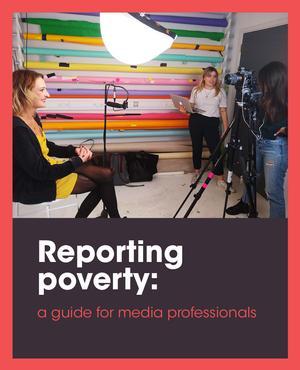
© Private (Cover image: © Cosmopolitan magazine)
Journalists, politicians and campaigners talk a lot about poverty – so what is it? Put simply, poverty is not having enough resources to meet your basic needs, like food, utility bills and travel. Fourteen million people are living in poverty in the UK – that's one in five of us.
We see poverty in countless stories: families struggling to make ends meet, soaring housing costs pushing people into debt, the rise of insecure and low-paid work, unequal access to resources, flaws in the benefits system cutting people adrift. This year, we've seen new issues: the pandemic leaving many children in low-income families unable to access vital digital resources, and millions more people swept into debt and hunger.
This guide is for journalists who want to report on these complex issues accurately, sensitively and powerfully. We know today's newsrooms are more stretched than ever, that journalists are doing ever more work in less time, and that journalists themselves are in a difficult industry. This guide aims to help.
Insights from people experiencing poverty and media professionals
People experiencing poverty want to draw attention to the challenges, call for action to improve things, highlight what would make a difference, and show solidarity with others. We conducted focus groups and worked with people with experience of poverty, journalists from a range of media outlets, anti-poverty organisations and media organisations. The result is this guide.
It offers practical recommendations on how media reporting on poverty can better represent people’s experiences, reduce the risk of negative impacts on people in poverty, and build support for structural solutions.
This guide was co-produced by an advisory group, whose members are listed at the end of this guide, and supported by ATD Fourth World, Church Action on Poverty, the Joseph Rowntree Foundation, the National Union of Journalists and On Road Media.
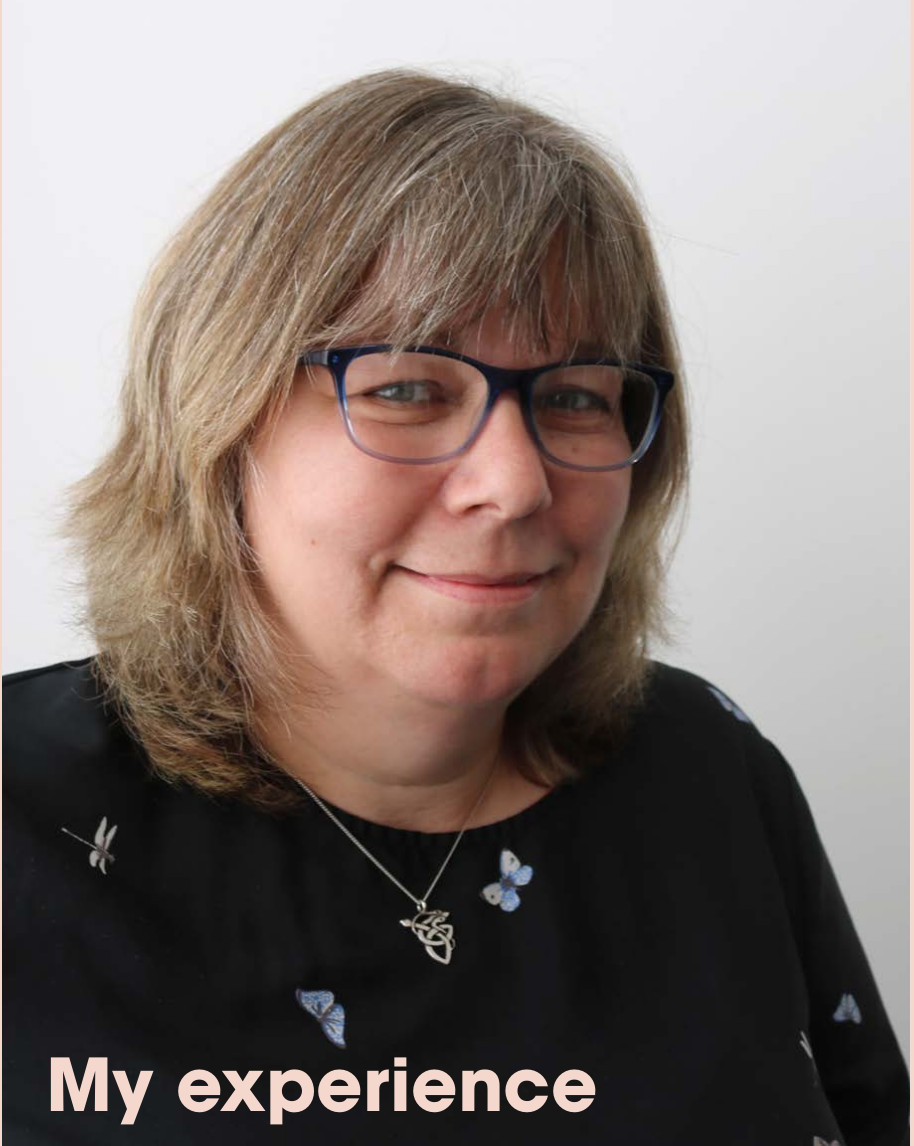
© Private
My experience
Shirley
Thanks to On Road Media, I've had many opportunities to interact with the media from all political persuasions and platforms and they have all been really positive. And slowly, very slowly, I've seen the rhetoric directed at folk like me change from one of an individual blame, to one being more aware of the structural constraints that we face every single day.
Most recently, I spoke with Jane Garvey on BBC Radio 4 Woman's Hour about another poverty campaign I participate in. Jane herself was lovely – calling me up beforehand to ensure I didn't feel too nervous and to get to know me a little better. Star-struck was not the word. She listened and was so responsive to what I had to say.
It needs to be remembered that without participants with experience of the issues folk in poverty face, there is no show, no article, no podcast or opinion piece. Being sensitive, respectful of our situations and treating us with dignity is vital in building a relationship built on mutual trust from which further collaborations and networking can grow.
Individuals, systems and statistics:
balancing the three
Some stories about poverty focus on statistics. Others focus on individual people. Others focus on the systems. The very best coverage includes and balances all three.
We know that dry reports without any real human input are no use to you or your readers and viewers. But stories that focus only on individuals are also incomplete and less effective. By explaining the systems that led to that person's situation, and making clear how many others are affected, stories become much more powerful.
Journalists seek interviewees to humanise a story, and the interviewee needs you to add the structural context, to make clear that their story illustrates a wider problem that society can choose to address.
When Mary and Sydnie from our workshops spoke to the BBC in January, for instance, they talked about the consistently low level of carers' allowance and the way that it trapped them in poverty. The story also contained national statistics and explained the system and policy clearly, making for a powerful package.
A combination of statistics and personal, everyday experiences will give the most accurate sense of the reality of poverty in the UK today.
Statistics: Useful for giving a sense of scale, challenging misinformation, and drawing audiences' attention. On their own, unlikely to change minds.
Systems: Vital for explaining how a story of poverty came about. They indicate where solutions lie. Without this, the story has less impact and holds nobody to account.
Individuals: The all-important human element that conveys the daily reality. Life changes when you are in poverty. It means not being able to pay your bills, not having options or free decisions over where you live or where your kids go to school. This element is vital, but without the other strands, coverage risks being merely pitying, and audiences may want to help that individual but will fail to see the broader change that could help countless others. Remember too, the individual is well-placed to talk about what would make a difference and they are not defined by their poverty – they will want to talk about their abilities, hopes and aspirations as well as the challenges they are facing.
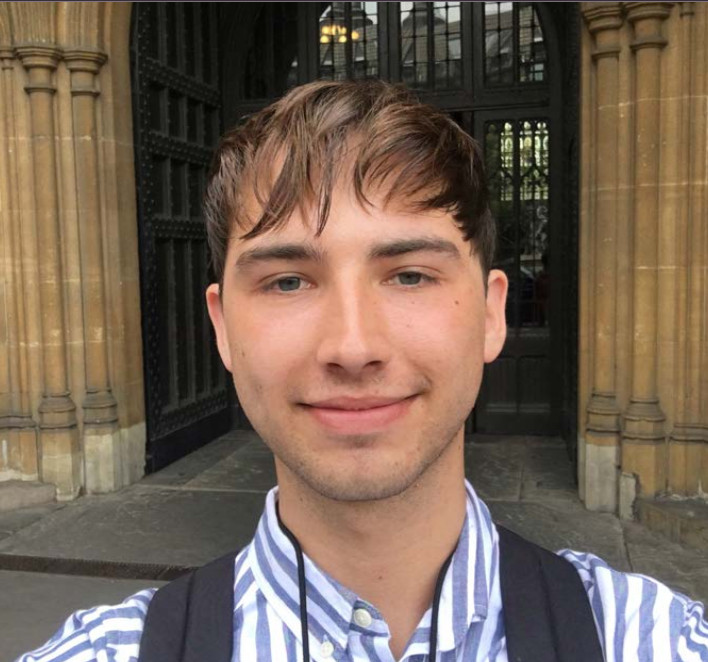
© Private
My experience
Dylan
At Thrive (a community organisation challenging poverty in Stockton, Teesside), we have had our fair share of both positive and negative media experiences. In the last few years, we have been more selective with who we choose to work with, open up to and give our time.
We often try and build a relationship with a journalist and politely ask if they could come and visit our coffee mornings before they conduct an interview. If this isn't possible we at least prefer some time to talk to them, and get to know each other better. We often find our Thrive volunteers will open up to a journalist who is polite, positive, and often times those who talk in a familiar way to the volunteers.
Another aspect of a positive media interaction is being kept in the loop. Often times we like to be updated on how the piece is coming along, when it is being published and maybe even a follow up conversation afterwards to talk about the experience.
The Thrive team want to share their stories to direct the narrative of poverty and inequality in a more compassionate and progressive way, to help others and to hopefully add to a cultural shift on the view of poverty.
Perfect coverage for us would be a piece that focuses on making positive changes, overcoming challenges, and looking towards solutions to poverty.
We often find that we love working with journalists who are rooted in our community, and are passionate about telling empowering stories about Teesside. An example of this was when we worked with Anna Twizell, a community reporter for Teesside Live.
What stories say vs what people hear
Research on public attitudes to poverty conducted with 20,000 members of the public has enhanced our understanding of how the public think about poverty, and what sort of stories generate different reactions.
Here are some of the key lessons from the research, which is linked below:
Tips and pitfalls
- Ask people experiencing poverty what solutions they would like to see. They are first-hand experts who can contribute to the debate.
- Talk about real and potential solutions and the projects making a difference in communities.
- Try to avoid relying too heavily on statistics or assuming that they will speak for themselves.
- Think twice before running myth-busting articles: evidence shows that these actually reinforce the myths.
- Take care to avoid talking about 'Dickensian' levels of poverty or making comparisons to the past. Research shows this merely leads people to switch off and to think 'things simply can't be as bad as that'.
- Try to avoid language or images that evoke these ideas – for example, images of begging bowls or slums. These make it difficult for audiences to recognise the problem as one really happening in our society.
- Humanity and shared values are more powerful than statistics. Values of compassion and justice are shown to resonate most strongly with the public.
- It's best to avoid talking about situations being 'unfair' or people having 'no choices left.' The research shows people are unlikely to be convinced by this framing. Try talking about what is right and wrong, and people's options being restricted or cut off instead.
- We all want to see a reduction in UK poverty, so be sure to give people the opportunity to talk about the things that are making a difference in their community.
For more information about the research, you can read the report, How to talk about poverty in the United Kingdom by the Frameworks Institute (published in 2018), and find out how to apply it in your work in JRF's Framing toolkit.
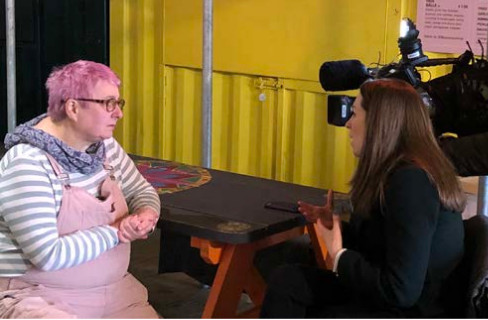
© Private
Our experience
Mary and Sydnie
Mary Passeri and Sydnie Corley from York featured on BBC Six O’Clock News and Radio 4 in February, to talk about the impact of the low level of the carer’s allowance. They are co- chairs of York Food Justice Alliance and run a community arts project in the city centre, where filming took place.
Mary and Sydnie felt the time that the journalist took was the key to putting them at ease and making the piece a success. The journalist phoned them a week before for a long chat, and again spent time talking through the process on the day before filming.
Mary said:
"We’ve done media work because we want to challenge preconceptions. People have ideas about single parents or people on disability benefits or whatever, and we wanted to challenge the stigma and stereotypes. What would we say to journalists? Just be honest. Fully honest about what they want to know and what the wider story is about. The BBC journalist we spoke to was very clear, we had long talks about what she needed to know and we had a very honest story."
Best practice: working with interviewees with experience of poverty
Being interviewed by a journalist for the first time can be daunting. Interviewees may be nervous but will be keen to get their message across. Establishing trust is vital and there are practical steps that can maximise the chances of an interview going well for everyone.
- Brief well. Focus group participants repeatedly said they felt more able to share their story when they knew the purpose and what was going to happen. Be clear what the story is about, your intentions, why this person is being interviewed, and who else is involved. How does their interview fit into the wider piece?
- Talk about what you'll cover. You can't script a list of questions, but talk about the main themes you're likely to cover, and your overarching aim. People often ask for questions in advance to calm their nerves, or to avoid a particularly personal issue. They may want to build more trust or learn more about their role in the piece. For broadcast interviews, sharing just the first question can help calm nerves.
- Keep people in the loop. If anything big changes in a story before publication/broadcast, let interviewees know. Tell people when you expect a piece to run, so they can look out for it and share it, and prepare for the publicity. Crucially, if someone's contribution has been substantially reduced or elevated, and especially if it is dropped, then let them know before the story runs and explain the reason.
- Be clear on their role. Is someone being interviewed about their experience for a specific angle or have they scope to talk more broadly about issues around poverty? Clarity ensures realistic expectations.
- Treat interviewees with dignity. Be sensitive to what interviewees might need – for example, if they're meeting you somewhere, can you meet their travel costs? Can you help provide any technical access they need? Where are they comfortable being interviewed, and particularly filmed or photographed? Take care not to change these plans without warning, and be particularly sensitive in someone's home. Might they want to bring someone with them for support during an interview?
- Address possible solutions as well as problems. In the focus groups, a recurring motivation was people's desire to talk about projects that bring hope or change. Dwelling on the problem of poverty and not identifying solutions makes for an incomplete story. Ask questions that enable people to speak about solutions and wider structures, as well as their own immediate situation.
- Time. A key theme in the workshops was time. Many of the most positive and powerful experiences that interviewees and journalists had was when they were able to prepare together. We know this very often isn't possible – but it sometimes is. The organisations behind this guide are able and ready to work with you on in-depth coverage and to help identify potential contributors. Get to know organisations as well as individuals. Positive stories can be springboards to more. Keep in touch with people who have shared some of their story, and that trust could lead to further powerful pieces.
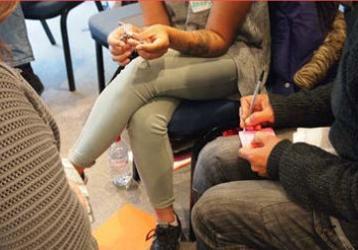
© Private
My experience
Claire Donnelly, Senior Reporter, The Mirror
The Wigan Pier Project was designed to be a collaborative project – between journalists and contributors. We wanted to give people a platform to talk about their experiences. We worked closely with many organisations and Bernie was introduced to me by Christians Against Poverty (CAP). They told me about Bernie's experiences. We would have liked to meet in person but because of time constraints we had to speak on the phone first. Bernie shared her story with me, I drafted a first-person piece and sent it to Bernie to check.
Once she was happy with it we got ready to publish it. I was then able to visit Bernie a few weeks later in her home, somewhere she felt comfortable talking. Photography was really important. We used the same photographers for the two-year project, so they understand its aims and our way of working. We wanted portraits that conveyed the truth of someone's situation but also represented them with dignity, and we felt that we achieved this with Bernie. I was able to stay in touch with Bernie and develop a good relationship with the CAP team too.
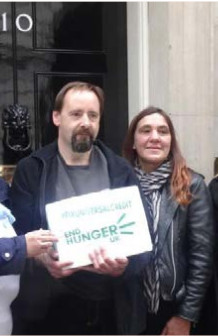
© Private
Our experience
Tony and Sue
Tony and Sue told their story in the Mirror when they helped to present the Fix Universal Credit petition at 10 Downing Street in 2018, and also spoke with a regional newspaper reporter.
The couple had been working in a pub with live-in accommodation, but became homeless when a move to another pub fell through. They spent several weeks living in a tent and found the design of Universal Credit made things worse rather than better.
Tony said: "There does need to be more understanding when things really go wrong, so people can see how systems can be improved.
"The journalist we spoke to really listened and understood, and she did not misrepresent us, which was the most important thing. People in bad situations have sometimes been badly presented by the media in the past and it was nice to see honesty. I'm not sure we made a vast difference to society but it certainly had some impact and Sue and I are in a much better position now in the flat than we were back then."
Images
Many contributors are unhappy about the extreme stock images often used to accompany articles about poverty.
A small handful of stock images are used far too often, and nobody recognises themselves or their communities in these images. Many people find them offensive and feel they contribute to shame and stigma, reinforce fatalism, and fail to reflect the breadth of poverty in the UK.
Instead, ask contributors what pictures they think would help tell the story well. Think about the elements of a story that you want the audience to focus on, rather than 'poverty' as an abstract concept. Images of community projects and activities are preferable, and shots of wider communities, such as aerial shots, are preferable to ones showing only the most derelict buildings or streets.
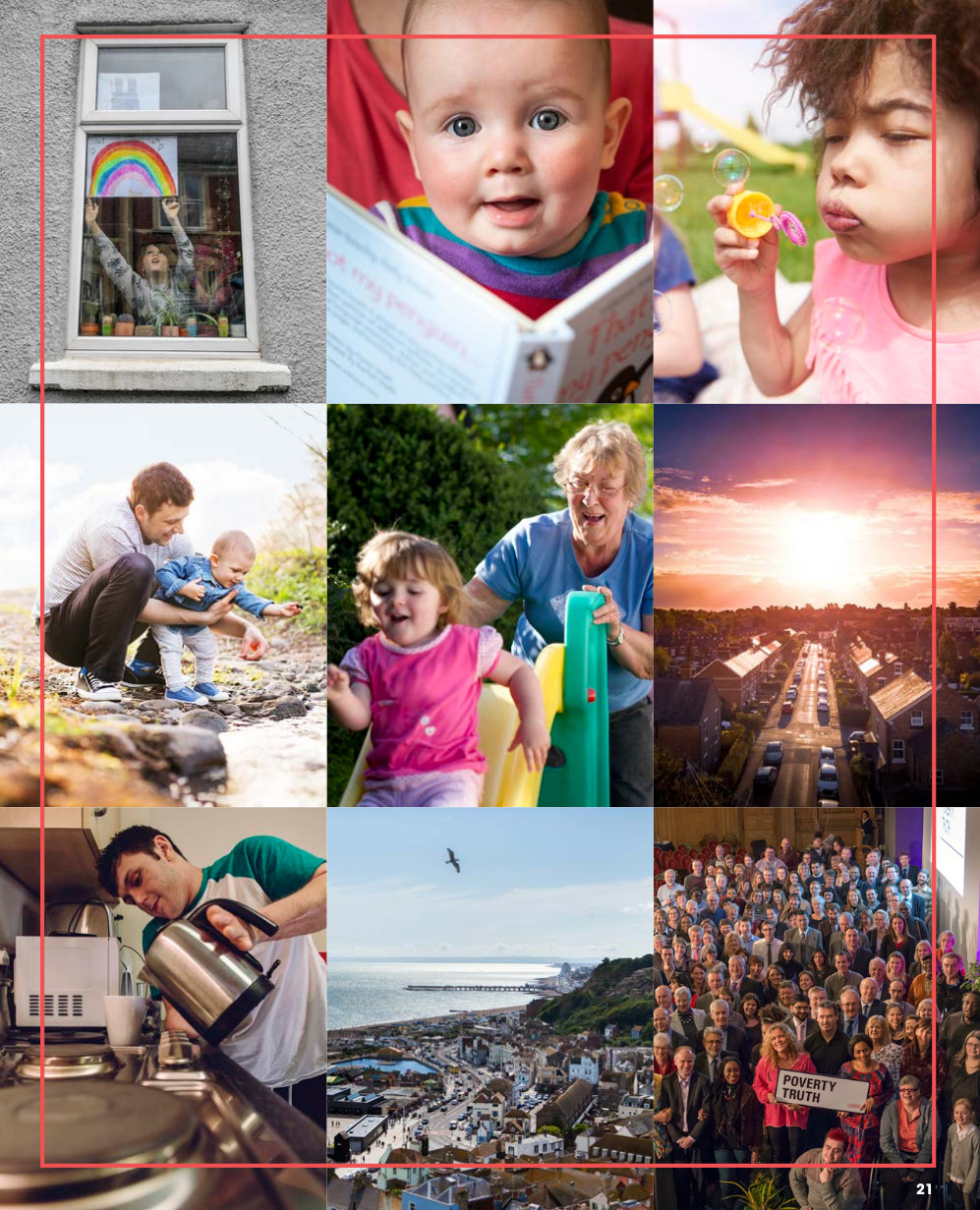
© Private
Organisations you can work with
The organisations behind this guide, and many more, can provide data, research, context, policy solutions and connections to people with direct experience of poverty.
The Joseph Rowntree Foundation (JRF) is an independent social change organisation working to solve UK poverty. JRF aims to inspire action and change, and publishes a range of research on the causes of and solutions to poverty.
Church Action on Poverty is a national charity committed to tackling poverty in the UK. Church Action on Poverty works in partnership with churches, and with people in poverty themselves, to tackle the root causes of poverty.
On Road Media is a charity that improves media coverage and public understanding of misrepresented groups and issues, including poverty. They support people with first- hand experience of issues to do media work and influence storytelling approaches.
The National Union of Journalists (NUJ) – NUJ members can access resources about representation and be supported in challenging stereotypes.
Bringing new perspectives to the newsroom
There is rightly a growing focus on increasing the diversity of UK newsrooms. Providing opportunities for people with direct experience of poverty to work in and with the media industry is an important dimension of this work.
If you work for a news organisation, your voice can be influential in advocating for this. Does your organisation's recruitment process encourage applications from a wide range of candidates? Are there opportunities for people with experience of the issues your organisation covers to discuss, challenge and shape coverage of those issues?
If you are interested in building understanding of poverty at your organisation, On Road Media's Talking About Poverty project works to bring people with direct experience into media organisations for informal, behind-the-scenes meet-ups to explore poverty and related issues.
Advisory group members:
Patricia Bailey, activist of ATD Fourth World, Poverty2Solutions and the APLE Collective
K Biswas, critic
Charlie Brinkhurst-Cuff
Carlie Brough
Amanda Button, support team for National Coordination of ATD Fourth World, Poverty2Solutions and the APLE Collective
Tony Carson
Natasha Clark, Digital Political Editor, The Sun
Sydnie Corley, York Food Justice Alliance
Aasma Day, North of England Correspondent at HuffPost UK. Member of Journalist Advisory Panel for the Independent Press Standards Organisation (IPSO)
Claire Donnelly, Senior Reporter, The Mirror
Chris Frost, Chair, National Union of Journalists ethics committee
Jayne Gosnall
Claire Kendall, UK Affairs Producer, BBC News
Jackie Long, Presenter and Social Affairs Editor, Channel 4 News
Mary O'Hara, Author and Journalist
Lindsay Pantry, Social Affairs Correspondent, The Yorkshire Post
Mary Passeri, York Food Justice Alliance
Serina Sandhu, Senior Reporter, the i paper
Brian Scott, Scottish Poverty Truth Community
Diana Skelton, National Coordination Team of ATD Fourth World
Nicola Spurr
Shirley Widdop – Disabled Lone Parent, Expert by Experience & Volunteer for Myelopathy.org
